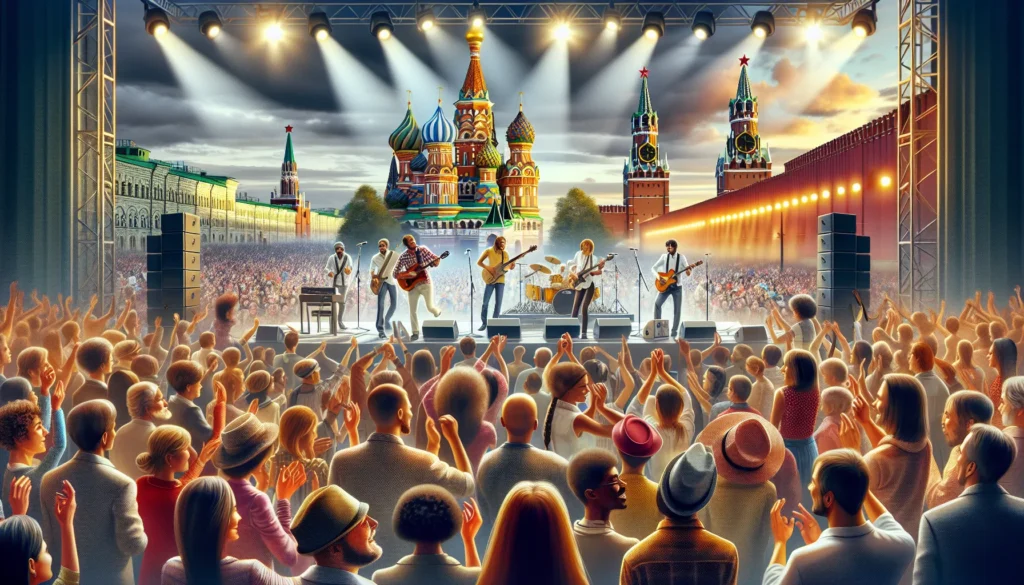Table of Contents
ToggleRussian pop music isn’t just a genre; it’s a vibrant explosion of culture, emotion, and catchy tunes that’ll have you dancing like nobody’s watching. From the glitzy stages of Moscow to the cozy cafes of St. Petersburg, this musical scene offers a delightful mix of traditional melodies and modern beats. It’s like a hearty borscht—rich, flavorful, and guaranteed to warm your soul.
Overview of Russian Pop Music
Russian pop music encompasses a vibrant array of styles and influences, reflecting the country’s rich cultural tapestry. Artists frequently blend genres like rock, hip-hop, and electronic dance music, creating unique sounds that resonate with diverse audiences. The scene thrives on innovation, drawing inspiration from global trends while maintaining distinct local flavors.
Moscow serves as a hub for major pop concerts and events, showcasing high-energy performances that captivate thousands. Vibrant festivals in the capital attract top artists and dedicated fans alike. St. Petersburg offers a contrasting atmosphere, where smaller venues host intimate shows, allowing for deeper connections between performers and listeners.
Lyric themes often explore love, heartbreak, and social issues, resonating strongly with listeners. Many songs incorporate folk elements, enhancing the cultural connection and depth of the music. Popular artists like Alla Pugacheva and Dima Bilan exemplify this blend, achieving both national and international acclaim.
The rise of digital platforms has transformed how artists share their music. Streaming services allow for easier access to tracks, propelling new talents into the spotlight. Social media plays a crucial role in promoting artists, enabling them to build substantial followings without traditional marketing routes.
Awards ceremonies, such as the Golden Gramophone, celebrate artistic excellence and provide greater visibility for emerging stars. Recognition at these events often boosts an artist’s career, showcasing their contributions to the evolving genre. Russian pop music continues to evolve, maintaining its relevance on both national and international stages.
Historical Context
Russian pop music has deep roots and a vibrant evolution shaped by cultural and sociopolitical influences. Understanding its origins and the impact of the Soviet era provides insights into its development.
Origins of Russian Pop Music
Russian pop music traces its origins to the early 20th century. The genre began to flourish in the post-revolution period, incorporating elements from Russian folk and classical music. Early composers, like Alexander Vertinsky, created poignant songs reflecting the era’s struggles and aspirations. In the 1960s, artists mixed Western rock influences with traditional sounds, paving the way for modern pop. This blend attracted a broad audience, establishing the foundation for future musicians. As the music scene evolved, pop began intertwining with various genres, enhancing its appeal across generations.
Influence of Soviet Era
The Soviet era left a profound mark on Russian pop music. State control influenced song content, often restricting themes to align with government ideals. Performers like Alla Pugacheva emerged as icons, skillfully navigating these constraints while connecting with people’s emotions. Music festivals and state-sponsored events showcased pop artists, facilitating exposure despite censorship. The 1980s ushered in a more relaxed atmosphere, allowing artists to experiment with Western styles. As the Soviet Union dissolved, the pop music landscape diversified, integrating global influences and expanding its reach. However, the era’s legacy still resonates in contemporary Russian pop, shaping its identity.
Key Artists and Groups
Russian pop music features a variety of influential artists and groups shaping the genre today. Their unique sounds and styles draw significant attention both domestically and internationally.
Prominent Figures in Contemporary Russian Pop
Alla Pugacheva stands as a legendary figure in Russian pop music. Known for her powerful voice and emotional delivery, she has inspired generations. Dima Bilan gained fame after winning the Eurovision Song Contest in 2008, showcasing his blend of pop and contemporary rhythms. Other popular artists include Sergey Lazarev and Lena Katina, who attract large followings and consistently release chart-topping hits. These artists frequently collaborate, pushing the boundaries of pop music and keeping it fresh.
Impact of Folk Elements
Folk elements enrich Russian pop music, creating a distinct cultural flavor. Many contemporary songs incorporate traditional melodies or instruments, grounding them in Russian heritage. This connection to folklore resonates with audiences, evoking nostalgia and pride. Artists often weave lyrical themes relating to love, nature, and identity, enhancing the emotional depth of their music. Such elements create a fusion that appeals to both younger and older generations, ensuring relevance in a constantly evolving music landscape.
Musical Characteristics
Russian pop music features a variety of unique styles and sounds, shaped by cultural influences.
Common Genres and Styles
Genres such as shanson, modern pop, and rock dominate the landscape. Artists frequently blend electronic elements with traditional sounds, creating dynamic performances. Regions like Moscow and St. Petersburg thrive with distinct styles, showcasing the influence of their vibrant music scenes. Group performances often highlight high-energy dance routines, while solo artists emphasize vocal prowess. This fusion appeals to diverse audiences and promotes cross-genre collaborations.
Lyric Themes and Storytelling
Themes of love and heartbreak resonate deeply within Russian pop music. Many songs tackle social issues, providing commentary on contemporary life in Russia. Storytelling plays a vital role, with artists weaving narratives that connect with listeners. Folk-inspired lyrics often enhance the emotional depth, invoking nostalgia and cultural pride. Audiences appreciate the relatable experiences depicted in the songs, reinforcing connections across generations.
Popularity and Global Reach
Russian pop music enjoys significant popularity both within the country and beyond. The genre, characterized by its energetic rhythms and emotional themes, resonates with listeners of various backgrounds.
Role of Media and Streaming Platforms
Media and streaming platforms play a pivotal role in the evolution of Russian pop music. Platforms like YouTube and Spotify allow artists to showcase their work, leading to increased visibility. Listeners access a wide range of music anytime, breaking geographical barriers. Social media platforms also promote engagement between artists and fans, fostering vibrant communities. As a result, emerging artists gain exposure, which contributes to their career development. This digital shift transforms how audiences discover and interact with Russian pop, ensuring a dynamic music landscape.
Russian Pop Music Beyond Borders
Russian pop music reaches international audiences through various cultural exchanges. Festivals and collaborations with global artists introduce unique sounds to the world, enhancing its appeal. Noteworthy artists, such as Dima Bilan and Sergey Lazarev, have expanded their reach by participating in global events like the Eurovision Song Contest. Recognition from international media outlets promotes greater interest and appreciation for the genre outside Russia. Collaborations often result in innovative tracks that fuse different musical styles, capturing diverse listeners. These developments highlight the genre’s adaptability and the rich cultural narratives embedded in its songs.
Russian pop music stands as a vibrant testament to the country’s rich cultural heritage and evolving artistic landscape. Its ability to blend traditional sounds with contemporary influences creates a unique auditory experience that resonates deeply with listeners. As artists continue to innovate and explore new genres, the genre remains relevant and impactful both at home and abroad.
The rise of digital platforms has opened doors for emerging talents, ensuring that fresh voices contribute to this dynamic scene. With its infectious rhythms and emotionally charged lyrics, Russian pop music not only entertains but also fosters connections among diverse audiences. As it continues to evolve, the genre promises to captivate hearts and minds for years to come.





